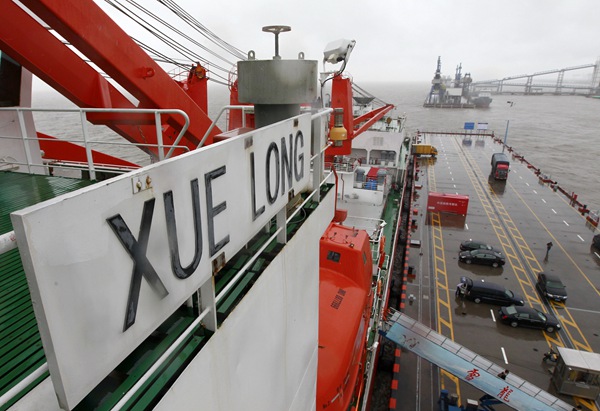Chinese icebreaker returns to home port
(Xinhua) Updated: 2014-09-23 12:11
SHANGHAI - China's sixth Arctic expedition team aboard icebreaker Xuelong, or "Snow Dragon", has returned to its home port in eastern China's Shanghai after a two-and-a-half-month mission.
Xuelong set out from Shanghai on July 11 and has since traveled some 22,000 km to explore key areas such as the Bering Sea, the Chukchi Sea and the Canada Basin.
It traveled as far as 81.11 degrees north latitude and 156.30 degrees east longitude, the team said.
Scientists studied geomagnetic data and the receding of sea ice in the Arctic waters, and researched how the Arctic's atmosphere, currents and ice interact, among other tasks, said Pan Zengdi, chief scientist of the expedition.
Head of the expedition Qu Tanzhou said the mission has reinforced Chinese scientists' understanding of the Arctic region, adding that it is of "strategic importance" to elevate the country's participation in Arctic affairs.
Put into use in 1994, the Ukraine-built Xuelong can break ice that is 1.2 meters thick. It finished China's 30th scientific expedition to Antarctica in mid-April.
- Arctic ice shrinkage alarms returning Chinese expedition
- Franklin expedition ship found in Canadian Arctic
- Russian military to establish permanent base in Arctic
- Arctic expedition team conducts scientific study
- Chinese icebreaker heads for 6th Arctic expedition
- China embarks on sixth Arctic trek to explore the North Pole
- Govt encourages people to work 4.5 days a week
- Action to be taken as HIV cases among students rise
- Debate grows over reproductive rights
- Country's first bishop ordained in 3 years
- China builds Tibetan Buddhism academy in Chengdu
- Authorities require reporting of HIV infections at schools
- Typhoon Soudelor kills 14 in East China
- Police crack down on overseas gambling site
- Debate over death penalty for child traffickers goes on
- Beijing to tighten mail security for war anniversary








